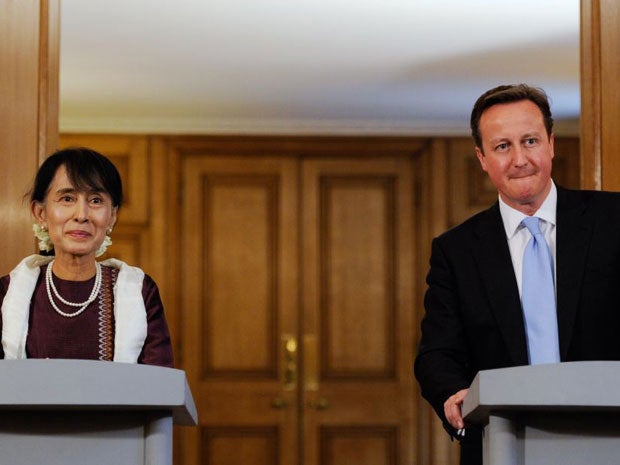Your support helps us to tell the story
From reproductive rights to climate change to Big Tech, The Independent is on the ground when the story is developing. Whether it's investigating the financials of Elon Musk's pro-Trump PAC or producing our latest documentary, 'The A Word', which shines a light on the American women fighting for reproductive rights, we know how important it is to parse out the facts from the messaging.
At such a critical moment in US history, we need reporters on the ground. Your donation allows us to keep sending journalists to speak to both sides of the story.
The Independent is trusted by Americans across the entire political spectrum. And unlike many other quality news outlets, we choose not to lock Americans out of our reporting and analysis with paywalls. We believe quality journalism should be available to everyone, paid for by those who can afford it.
Your support makes all the difference.Aung San Suu Kyi appealed to Britain today "as friend and an equal" to support the people of Burma in their drive for democracy.
Delivering a historic address to a joint session of both Houses of Parliament, the Nobel peace laureate said she was seeking practical help to address the problems still besetting her country.
In particular, she said she hoped the UK could help rebuild the education system while providing new investment for the future.
"I am here in part to ask for practical help, help as a friend and an equal, in support of the reforms which can bring better lives, greater opportunities, to the people of Burma who have been for so long deprived of their rights and their place in the world," she said.
"My country today stands at the start of a journey towards, I hope, a better future. So many hills remain to be climbed, chasms to be bridged, obstacles to be breached.
"Our own determination can get us so far. The support of the people of Britain and of peoples around the world can get us so much further."
Ms Suu Kyi, who received a standing ovation from MPs and peers in a packed Westminster Hall, said the key to reform was the establishment of a strong parlimentary institution.
She said that after 49 years of direct military rule, it would take time for the country's fledgling parliament to find its feet and its voice.
"Our new legislative processes, which are undoubtedly an improvement on what went before, are not as transparent as they might be," she said.
"I would like to see us learn from established examples of parliamentary democracies elsewhere so that we might deepen our own democratic standards over time."
Ms Suu Kyi said that after independence Burma was briefly regarded as "the country most likely to succeed in South East Asia".
"Things did not, however, go entirely to plan. They often don't in Burma, and indeed in the rest of the world.
"Now once again we have an opportunity to establish true democracy in Burma. It is an opportunity for which we have waited many decades.
"If we do not use this opportunity, if we do not get things right this time around, it may be several decades more before a similar opportunity arises again."
The opposition leader praised President Thein Sein's "sincerity" in taking steps towards reform.
She said she had spent only a "matter of minutes" in the Burmese parliament so far, and had found the atmosphere "rather formal".
"There is certainly no heckling. I would wish that over time perhaps we will reflect the liveliness and relative informality of Westminster."
To laughter, Ms Suu Kyi went on: "I am not unaware of the saying that more tears have been shed over wishes granted than wishes denied.
"Nevertheless, it is when Burma has its own satisfactory equivalent of Prime Minister's Questions that we will be able to say that parliamentary democracy has truly come of age."
Ms Suu Kyi said she hoped Britain could play a particular role in developing Burmese education, which was currently "too narrow" and needed reform.
British businesses could also help the reform process in Burma through "democracy-friendly investment".
"By this I mean investment that prioritises transparency, accountability, workers' rights and environmental sustainability," she said.
The Burmese opposition leader said she had first developed her understanding of parliamentary democracy through learning at Oxford about 19th century British prime ministers William Gladstone and Benjamin Disraeli.
"I learned the basics, that one accepts the decision of the voters, that the governing power is gained and relinquished in accordance with the desires of the electorate.
"That is the system that goes on and that ultimately everyone gets another chance. These are things taken for granted here in Britain but in 1990 the winner of the elections, the NLD, was never allowed even to convene parliament.
"I hope that we can leave such days behind us and that as we look forward to the future it will be the will of the people that will be reflected faithfully in Burma's changing landscape."
She read the final verse of the poem Say Not the Struggle Naught Availeth, a favourite of Winston Churchill which she said had been sent to her by a friend in the 1990s.
"I would like to emphasise in conclusion that this is the most important time for Burma, that this is the moment of our greatest need, so I would ask that our friends both here in Britain and beyond participate and support Burma's efforts towards the establishment of a truly democratic and just society," she said.
She said Burma had not yet entered the ranks of truly democratic countries but added: "I am confident we will get there before too long, with your help."
PA

Join our commenting forum
Join thought-provoking conversations, follow other Independent readers and see their replies
Comments